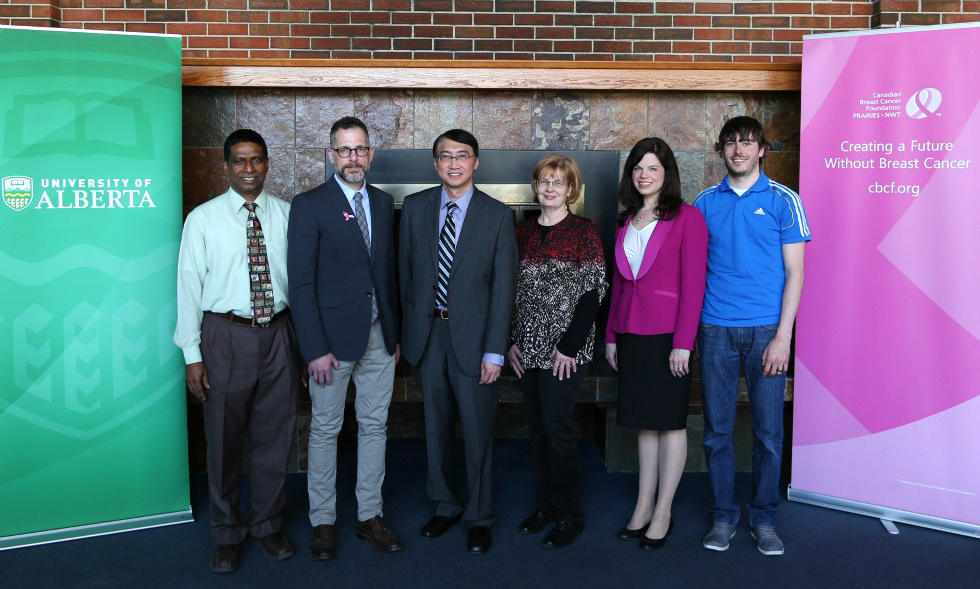
(From left) Cancer researchers Kurian Joseph, Alan Underhill, Wilson Roa, Mary Hitt, Lynne-Marie Postovit and Justin Pare were awarded a total of $1.6M in funding from the Canadian Breast Cancer Foundation.
"You have breast cancer."
According to the Canadian Breast Cancer Foundation (CBCF), one in nine Canadian women will hear these words during her lifetime. Breast cancer is the most common cancer diagnosed in Canadian women, accounting for more than 25 per cent of all cancer diagnoses in Canada.
These statistics, and these women, are the fire that inspires Mary Hitt.
"It's such a common type of cancer and it can affect people when they're very young. I think it's an important target," says Hitt, an associate professor in the Department of Oncology. "The CBCF organizations have done an amazing job on awareness, not just for the general public but for researchers too. They've worked hard so we all know how important it is to do something about it."
Hitt is one of five researchers at the University of Alberta to receive research funding from the CBCF: more than $1.6 million will be shared among Hitt, Lynne-Marie Postovit, Wilson Roa, Kurian Joseph and Alan Underhill, all of whom are members of the Department of Oncology. Postdoctoral fellow Justin Pare, a postdoctoral fellow in the laboratory of Tom Hobman in the Department of Cell Biology, has also received a postdoctoral fellowship grant.
"The Canadian Breast Cancer Foundation is an important partner of the FoMD. The CBCF currently provides $1.9 million in research support for 16 projects ranging from basic studies into the causes of breast cancer, as well as better diagnostics and improved treatments," says David Evans, vice-dean of research within the Faculty of Medicine & Dentistry. "Working together, our researchers and the CBCF's generous donors, are making a difference by continuing to improve the lives of people with breast cancer."
This support is latest in a long lasting relationship between the Faculty of Medicine & Dentistry and the CBCF. Since 2012, CBCF has dedicated more than $8.1 million to breast cancer research projects within the faculty in hopes of improving health outcomes for Canadians diagnosed with this disease.
"The CBCF has done a great job in helping to foster and support research in the Faculty of Medicine & Dentistry," says Hitt. "I know there are a lot of other researchers in the faculty who have been supported by the CBCF. I think it's really helped to move those programs forward."
Hitt hopes this funding boost will move her research forward as she tries to better target cancer cells with a combination of radiation therapy and viral therapy using a modified strain of the vaccinia virus. The virus, engineered in the laboratory of David Evans, lacks components that allow it to produce nucleotides, the precursors of DNA, and replicate in a normal cell. Instead, it utilizes the abundance of nucleotides found in cancer cells to replicate quickly.
The virus treatment might also activate an anti-tumour immune response. "If we were just using a drug to kill the cancer cells, you could get an immune response from that too. We predict there would be a lot more of an immune response against tumours if there is virus because it sends out so many signals to the immune system."
"The virus should be able to spread from cell to cell within the tumour until there are no more cancer cells to infect. The virus can't replicate in the normal cells surrounding the tumour, so that should act as a barrier," Hitt explains. "If it can get into the blood stream, it can potentially get into metastatic tumour sites, infect those and kill them."
Hitt notes that the vaccinia virus has been very effective in treating bladder cancer in lab models. Preliminary research of the virus' effectiveness in aggressive breast tumour models has not been as promising as it was in bladder cancer, but Hitt believe that supplementary radiation therapy may a practical solution.
"When you irradiate tumours, you kill off as much as you can but we know that there are cells left that aren't killed. Will those leftover cells support virus replication or not? That's the real question."